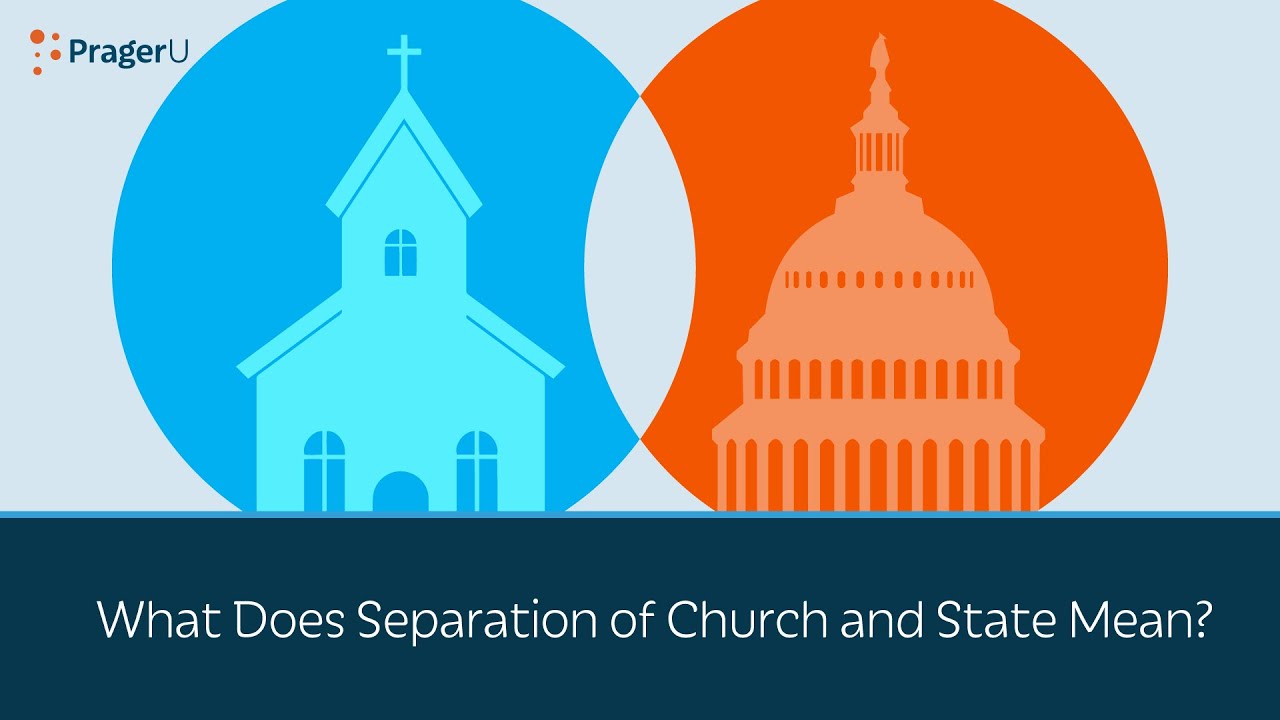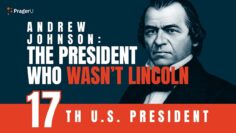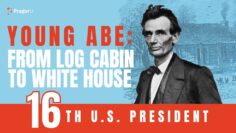
What Does Separation of Church and State Mean?
Nearly every American knows the phrase “separation of church and state.” Do you know where it’s from? Here’s a hint: it’s not in the Constitution. John Eastman, professor of law at Chapman University, explains how and why this famous phrase has played such an outsized role in American life and law.
FOLLOW us!
Facebook: 👉https://www.facebook.com/prageru
Twitter: 👉https://twitter.com/prageru
Instagram: 👉https://instagram.com/prageru/
SUBSCRIBE so you never miss a new video! 👉https://www.prageru.com/join/
To view the script, sources, quiz, visit https://www.prageru.com/video/what-does-separation-of-church-and-state-mean
Join PragerU’s text list to have these videos, free merchandise giveaways and breaking announcements sent directly to your phone! https://optin.mobiniti.com/prageru
Do you shop on Amazon? Click https://smile.amazon.com and a percentage of every Amazon purchase will be donated to PragerU. Same great products. Same low price. Shopping made meaningful.
SHOP!
Love PragerU? Now you can wear PragerU merchandise! Visit our store today! https://shop.prageru.com/
JOIN PragerFORCE!
For Students: http://l.prageru.com/2aozfkP
JOIN our Educators Network! http://l.prageru.com/2aoz2y9
Script:
Almost everyone has heard of the doctrine of the “separation of church and state.” Most Americans believe that it’s in the United States Constitution.
But there is no such phrase in the Constitution.
And there never was—for a simple reason: The Founding Fathers never intended for church and state to be completely separate. They saw religion—specifically, religions based on the Bible—as indispensable to the moral foundation of the nation they were creating.
So where does that phrase come from? It comes from one brief letter that Thomas Jefferson wrote to the Danbury Baptist Association in 1802.
At the end of a very long sentence in which Jefferson affirms his conviction that religious belief should be a private matter, and that the government should not interfere with such matters, he uses the phrase, “building a wall of separation between Church & State.”
And that’s where the phrase lived, undisturbed—lost in Jefferson’s voluminous correspondence—for almost 150 years. But more on that in a moment.
First, let’s discuss what the Constitution actually does say about religion and its role in public life. The answer is found in the First Amendment to the Constitution: “Congress shall make no law respecting an establishment of religion, or prohibiting the free exercise thereof.”
It’s plain what those words mean. The federal government could not establish a national religion, the common practice in Europe. The United States was going to be different. Americans would be free to follow the religion of their choice.
When James Madison first proposed what eventually became the First Amendment, his original wording was that “no religion shall be established” by Congress. But that language was later modified after it was pointed out that this might be taken to mean that the government, including the state governments, had no interest in religion at all. The Founders did not want this.
As George Washington said in his Farewell Address, “Religion and morality are indispensable supports of our political prosperity.” Washington’s view remained the nation’s view throughout the 19th century and into the twentieth. But that changed in 1947.
In that year, in the case of Everson v. Board of Education, the Supreme Court ruled in a 5-4 decision that under the First Amendment, neither a state nor the federal government could “pass laws which aid one religion, aid all religions, or prefer one religion over another.”
For the first time in American history, the First Amendment was not only about the prohibition of establishing a national religion, it was also about not giving any encouragement to any religion.
The modern “strict separation” view was born. And where did the five justices look for support for their argument? Not the Constitution—because there was nothing in the Constitution to help them, but to that one phrase Thomas Jefferson wrote back in 1802.
How ironic that the author of the Declaration of Independence, which recognizes the proposition that human beings have inalienable rights from their “Creator,” and not from government, was now being used to separate religion from the public square.
For Jefferson and the other Founders, religion was central to the entire American project. The Declaration of Independence and the Constitution are just two of countless examples where the government acknowledges its debt to God.
As the famously liberal Supreme Court Justice William O. Douglas wrote in the case of Zorach v. Clausen just five years after the Everson decision, “We are a religious people, whose institutions presuppose a Supreme Being.”
For the complete script, visit https://www.prageru.com/video/what-does-separation-of-church-and-state-mean
source











Oh look , a TRAITOR opens the vid. EASTMAN IS A TRAITOR.
Treaty of Tripoli, article 11, ur welcome
Including Congress shall make no law respecting an establishment of satanism. When the majority of the religious aren't.
I love how a bunch of leftist pigs who thought they were smarter than they actually are spammed the comments full of rebuttals without evidence💀
PragerU, correlation does not equal causation! Just bc you show a link between the adoption of a new perspective and events, DOES ❌ NOT ❌ mean that the new understanding CAUSED the increase or decrease in events.
Is PragerU accredited? 😂😅
Go read about all the religious inner conflicts in history. Catholics vs Protestants. Shia vs Sunni and tell me we need less separation. WHAT the absolute F. The most religious places in the world are the least peaceful, least educated, and least economically advanced.
Conveniently ignoring Jefferson's Virginia Statute of Religious Freedom
If the Founders intended for the United States to be a Christian nation, the would have said so explicitly in the Constitution. They made no mention at all of Christianity.
religion does not promote morality. Some of the most religious people I know are immoral in many ways. Morality is either there, or it's not.
you gonna believe this guy, who tried help orchestrated Jan 6? He literally tried to deny the constitution. The first amendment doesn’t have to Literally say “separation of church and state” to mean the separation of church and state.
Children don't need a mother or father they need two perant
The Talibangelicals need to be stopped!
let’s consider an argument that focuses on the precise wording of the First Amendment and the intentions of the Founding Fathers:
Textual Interpretation: The First Amendment states: "Congress shall make no law respecting an establishment of religion, or prohibiting the free exercise thereof…"1. This text can be read as a straightforward restriction on the powers of Congress, without any broader implications about a national religion or the separation of church and state. In this interpretation, the First Amendment simply prevents Congress from making laws that interfere with the establishment of any religion or the free exercise thereof by individuals.
Absence in the Federalist Papers: The Federalist Papers, a series of essays written by James Madison, Alexander Hamilton, and John Jay, were instrumental in shaping the Constitution23. However, they do not explicitly discuss the concept of a national religion or the separation of church and state in relation to the First Amendment. This absence could suggest that these concepts were not primary concerns of the Founding Fathers when drafting the First Amendment.
Founding Fathers’ Intent: The Founding Fathers were meticulous in their wording of the Constitution4. If they had intended to establish a strict separation of church and state or to prohibit a national religion, they could have explicitly stated so in the Constitution. The fact that they did not could be seen as evidence that these were not their intended interpretations of the First Amendment.
Historical Context: At the time the Constitution was written, several states had established religions5. The First Amendment was initially binding only on the federal government, not the states, suggesting that its primary aim was to prevent the federal government from interfering with state religions and individual religious practices, rather than to establish a separation of church and state or prohibit a national religion.
In this view, the First Amendment is about protecting individual religious freedom and preventing congressional interference with religious organizations, rather than establishing a separation of church and state or prohibiting a national religion. As always, interpretations can vary, and the meaning of the Constitution continues to be a topic of ongoing legal debate
tell me one developed first world country without separation of church and state.
The principle of the separation of church and state is widely regarded as a cornerstone of American democracy. This concept is often interpreted as a constitutional mandate, ensuring religious freedom and preventing the establishment of a national religion. However, a closer examination of the U.S. Constitution and the intentions of the Founding Fathers suggests that this interpretation may be a misreading of the original text.
The phrase "separation of church and state" does not appear anywhere in the U.S. Constitution. The First Amendment states that "Congress shall make no law respecting an establishment of religion, or prohibiting the free exercise thereof," but it does not explicitly call for a separation of church and state. The interpretation of these words as implying a strict separation is a matter of legal and historical debate.
The Founding Fathers were meticulous in their choice of language, carefully crafting the Constitution to reflect their vision for the new nation. If their intention was to create a rigid separation of church and state, they could have explicitly stated so in the Constitution. The absence of such explicit language suggests that the modern interpretation of the First Amendment may not align with the original intent of the Founding Fathers.
The phrase "separation of church and state" itself was coined by Thomas Jefferson in a private letter to the Danbury Baptist Association in 1802, well after the ratification of the Constitution. Jefferson's use of the phrase in a personal correspondence does not constitute a constitutional mandate.
Furthermore, the Treaty of Tripoli, signed in 1796, is often cited as evidence of the Founding Fathers' intent to separate church and state. Article 11 of the treaty states that "the Government of the United States of America is not, in any sense, founded on the Christian religion. However, it's important to note that this treaty was signed to secure commercial shipping rights and protect American ships in the Mediterranean Sea from local Barbary pirates. The statement about the U.S. government not being founded on the Christian religion may have been included to assuage the Dey of Tripoli and prevent further hostilities.
In conclusion, the principle of the separation of church and state, as commonly understood, is not explicitly stated in the U.S. Constitution. The interpretation of the First Amendment as implying such a separation may be a misinterpretation. A careful reading of the Constitution, an understanding of the historical context, and a consideration of the circumstances surrounding the Treaty of Tripoli suggest that the relationship between religion and government in the United States is more nuanced than the modern interpretation suggests.
I feel this video is very important and needed for what’s going on today. Thank you for sharing!!
[INFLATION 1 ÷ 60 ] so that [BILLIONS = FEEL LIKE TRILLIONS :-)_____] – S.L.S.
(..oN the WHOLE™ – i think, TRILLIONS – ..feel pretty good®..)
in case the state or also known as the government wanted to go back into the church – …….the for real way
7️⃣✝️…
As a Hindu, I’m good with church and state being separate. I don’t think it would work out great for me if the government became an arm of the Christian church.
Yet they have parrish replacing counties in roman catholic states.
If more attended church, maybe they wouldn't want to stick their noses in government.
If churches want a say on government policies, start paying taxes!
This is the guy indicted along with dirty don!
It is clear most of those commenting have no understanding of the constitution, have never read any of the Federalist papers or even read Jefferson's letter. The wall was to keep the government from stopping the church, not the other way around. Athiests have corrupted its meaning and effect to remove God from the public square and replace it with Marxist secular doctrine.
So Americas not a theocracy??
I work in a public, U.S. federal government owned and operated workplace, where some of the other government employees use government equipment to play Christmas music and other Christian music that many people are forced to hear. I assume that most of the people that work at and visit my workplace are not Christians. I know for a fact that some are Jewish, Muslim, and atheist. Is what the government employees playing the music doing illegal? I thought there is supposed to be separation of religion and government.
I believe in a higher power.. but the founding fathers realized this…. dot dot
Okay, let's throw some light on John Eastman's little talk. This video is so transparently typical you can see it coming a mile away. Understand one thing first: I for one believe the eternal struggle is between good and evil, not liberal and conservative. That said, let's look at so-called "PragerU.
It is not a university but a conservative organization which, in the past, holds beliefs against gun control, climate change, women's reproductive rights, LGBT rights and immigration. It also teaches a revisionist view of history as far as slavery and fascism.
In other words this is nothing but a slick video trying to push Christian Nationalism on the American people. So be warned.
It means that the churches have to start paying their taxes
The Separation of Church and State MEANS government is not allowed to infringe on religious freedom. Like in the case of the Christian man who refuses to bake gay wedding cakes. His rights were unconstitutionally infringed on! The Founders based our Constitutional Republic on the laws and principles of Christianity! Read the Declaration of Independence. That we humans are made EQUALLY in the image of God and THUS derive our rights FROM GOD, not any government on earth. This is a foundational principle of why America is exceptional. Western Civilization is founded on the Bibles principles and that's WHY we have freedom and liberty. You better educate yourself and read the Founders diaries, letters and documents. The reason America is worshipping a pagan religion aka Satanism is because Christians withdrew from politics and education. They gave into materialism and laziness. Now we are living in Sodom and Gomorrah.
If you don’t have separation of church and state, you eventually having the state telling us which religions matter. I can guarantee you that Christians who are in favor of breaking the separation of church and state would complain profusely if Buddhism or other non-Christian religions became a promoted religion in the United States. Let’s not kid ourselves. That’s why the separation of church and state is so important.